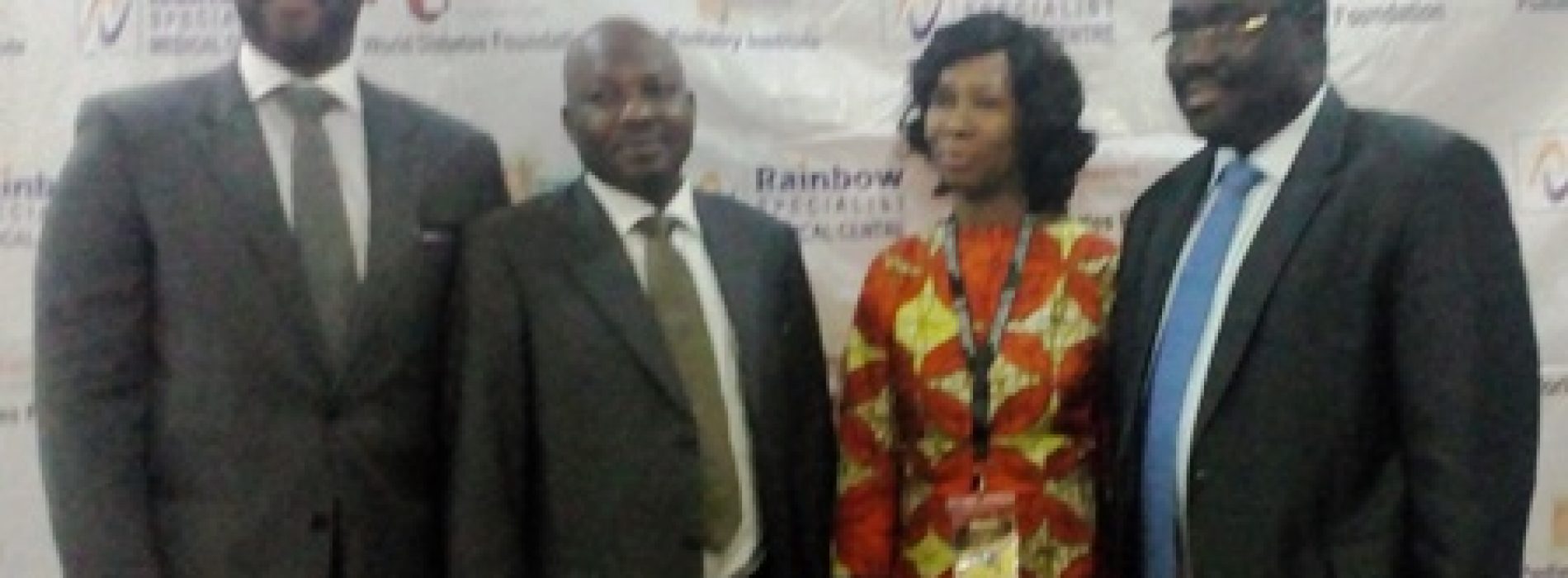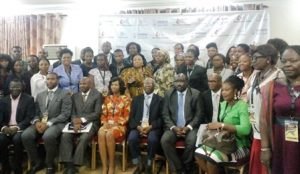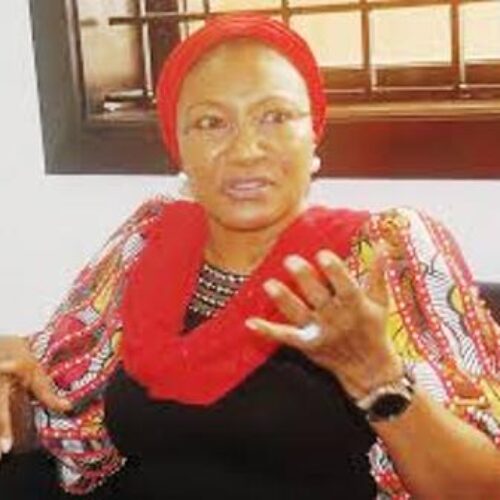Experts advocate Podiatry residency training for Nigeria

L-R: Faculty member from the US and Fellow, American Board of Foot and Ankle Surgery, Dr. Rahn Ravenell; Chief Medical Director, Abubakar Tafawa Balewa University Teaching Hospital, Bauchi, Dr. Alkali Mohammed; Chief Medical Director, Rainbow Specialist Medical Centre, Dr. Afoke Isiavwe and Dr Adedamola Dada, representing the Minister of State for Health, Dr Osagie Ehanire.
With the prevalence of diabetes mellitus on the increase world-wide, especially in developing nations like Nigeria, consequently resulting in increased diabetes complications, health experts today in Lagos called for the commencement of a residency training in Podiatry, a specialty that focuses on foot and ankle disorders, in the country.
Podiatry Medicine is currently not available in Nigeria, and the experts say there’s need for all persons presenting with foot ulcer to routinely get tested for diabetes mellitus.
Their call came during the opening ceremony of the ongoing 4th Annual International Five-Day Podiatry and Diabetes Foot Care Workshop, organized by Rainbow Specialist Medical Center in partnership with the Podiatry Institute, USA and the World Diabetes Foundation to improve management and prevention of diabetes mellitus.
In her welcome speech, Dr. Mrs Afokoghene Rita Isiavwe, Project Coordinator, Diabetes Podiatry Initiative, Nigeria and Consultant Endocrinologist/Medical Director, Rainbow Specialist Medical Center said: “With all the local researches and publications on diabetes foot in Nigeria from various health centers across the different geopolitical zones, we believe that this is the right time for the different stakeholders and policy makers in the Nigerian Health Sector to set up a frame work for the commencement of a Podiatry Residency Training Board in Nigeria.
She noted that diabetes mellitus is a leading cause of non-traumatic lower limb amputation world-wide, including Nigeria.
“Peculiar in the Nigerian setting is the late presentation of persons with diabetes mellitus foot syndrome as a result of ignorance of both the affected individual and the delay by medical personnel caring for them to refer them to appropriate center where they can be properly managed. These delays in presentation often lead to amputations as a means of saving the person’s life or even death,” Dr. Isiavwe said.
Speaking on the workshop theme: `Setting the Standard for Diabetes Foot Care in Nigeria,’ she said it is very important even more so at the primary care level.
“This is to ensure healthcare workers are able to recognize the high risk of diabetes foot and know how to promptly manage them to reduce delays in these affected individuals getting appropriate foot care services when needed. We are even advocating for all persons presenting with foot ulcer to routinely get tested for diabetes mellitus,” she said.
Dr Alkali Mohammed, Chief Medical Director, Abubakar Tafawa Balewa University Teaching Hospital, Bauchi who gave the keynote address acknowledged the fact that there is an increase on the prevalence of diabetes in Nigeria which he attributed to lifestyle modification which involve healthy living in terms of diet and in terms of increased physical activity.
“Now these are the things that can be solved through effective health education and awareness and I think it needs to be intensified and of course, it has to be followed with massive screening.
“Over half of the patients that are diabetic in Nigeria are not aware they have the disease. So if we have a massive exercise that is routine in all hospitals and I think many of those patients that are out there, they don’t know they have the disease and it can be picked.
“Diabetic foot disease is the commonest complication of diabetes. It is widespread and is responsible for the up to 80% of non traumatic amputation of legs and limbs in this country.
“Now if you look at that, it means that we need to have a very effective policy and the key thing about it is that through the right approach it can be prevented. It does not come at the onset of the disease; it comes as a complication. So if we have a policy where people that have diabetes are going through the appropriate foot care, inspection, health education and appropriate sugar control, most of the cases of what we see now will not be there.”
Speaking more about the policy, Dr Mohammed said: “The truth of the matter is that the national policy that we have now, the national strategy on management of non-communicable diseases in the country, is so much skewed towards both sickle cell and cancer as against diabetes which is the predominant disease among non-communicable diseases globally and in Nigeria.
“So as a result of that, if you look at this policy, it is so scanty that it has not addressed the core issues related to diabetes and foot care is one of the core issues either in terms of training, or appropriate things to be done to the patients when they come to the hospital, it is not there and that’s why we are pushing that the policy and the strategy should incorporate this important issues that are responsible for a lot of morbidity and mortality among the patients with diabetes and among Nigerians.
To reduce the cases of diabetes, Dr Mohammed recommends: “The first thing to do is that peoplel should go for routine screening whether you think you have symptom or not and whether you think there is family history or not. People should be conscious of what they eat, meaning that people should stay away from refined foods and go for more natural foods.
“The third most important thing is that we should modify our lifestyle and avoid sedentary lifestyle. We should engage in more physical activities either in our places of work, in schools. All those play grounds in schools should be activated so that children will engage in exercise,” he advised.
On behalf of the Hon. Minister of State for Health, Dr. Osagie Ehanire, the Managing Director/Chief Executive Officer of Federal Medical Center Ebute-Metta, Dr. Adedamola Dada thanked the organizers for inviting him and expressed happiness for the 4th edition of the programme. He encouraged them to sustain and expand the project, if possible.
He described diabetes as one of the most important non- communicable diseases in the country, saying that the health system at every level carries a huge burden of the disease which cannot be ignored. According to him, the prevention of complications remains a major strategy in the management of the condition.
“As an Orthopedic Surgeon, I know that foot care in diabetes is a very critical component of this preventive strategy. I am therefore happy that your team has been involved in training our care givers and hospitals in this very important aspect of preventive care for diabetes. I encourage you to expand this scope to as many health workers as possible. We all need this training and it will do our health system and our patients a lot of good.
“I must add that we recognize the vital role of the private sectors and the non-governmental organizations in our development and continued collaboration between the public and private sector in healthcare must be a priority. The private sector and non- governmental organizations also have an important role in delivering the primary healthcare of bringing healthcare to the door step of every Nigerian,” he said, while adding that government would continue to encourage the development of health insurance and managed care systems to achieve universal healthcare and the provision of affordable healthcare for all Nigerians.
About author
You might also like
Risks of diabetes in children
Q: What are the risks of diabetes in children? A: The frequency of diabetes is rising around the world, and studies are showing children are at increasing risk of developing
Relief in Niger Delta as EU, UNICEF support region with WASH projects
Relief came the way of some communities in Nigeria’s Niger Delta region with the commissioning of water and sanitation projects by the European Union (EU) and the United Nations Children Fund
FGM is gruesome, criminal violation of women’s rights- Senator Ireti
The Chairman Senate committee on Women Affairs, Senator Ireti Kingibe has described female genital mutilation, FGM as a gruesome act and a criminal violation of women’s rights and that of








0 Comments
No Comments Yet!
You can be first to comment this post!